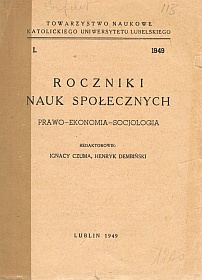Problemy prasowo prawne
Abstrakt
I. The· press and the press law
The press is one of the forms by which human thought expresses itself. As it is a synthesis of many different elements (author, publisher, editor, printer, bookseller, hawker) the press began to claim legislative regulations as a self existent object, an independent domain, having its own rights and duties. Tending to acquire its own legislation the press had to fight for its freedom. A number of press laws published during the XIX th century in different European states were the result of that fight. Poland, as consequence of the partitions, had at first regional press laws, but in the course of legal unification in all spheres of Polish legislation the press law got as well its own codification in the form of the President’s decree of May 10 th 1927, and then of a press decree of November 28 th 1938, which is in force to this day. As press law can concern the technic administrative side of printing, as well as the contents of printing, it is divided into administrative or police press law and criminal press law.
II. The idea and sorts of press crime
A press crime consists in: a) violating the press law prescriptions, b) abusing the freedom of printed word. The first one is called the proper press crime and is the violation of the police press law or of the criminal press law i.e. of the regulations defining the substance of a crime and providing a criminal sanction. The second one is called improper press crime; it is, properly speaking, a common crime defined in the criminal legislation, (independently of the press law), committed in the contents of printing e.g. diffamation, calling to committing of crimes etc.
III. Systems of criminal responsibility for press crime
Criminal responsibility for violation of police press law is based on the principles of criminal law. Press law does not bring in any special systems of criminal responsibility. If, however, we have to do with criminal responsibility for crimes committed in the contents of printing we find some special systems dealing with this sort of responsibility. (The Franco-Belgian system: nominatio auctoris; the Austrian system: responsibility for carelessness in allowing criminal contents to be printed and the German system: a combination of both the former ones). '
The system of the Polish press decree is also a combination of the Austrian (Press Decree art. 33) and the Franco-Belgian (Press Decree art 34/2) systems, but in another way than the German system. In it there is no presumption of guilt, that is to say no responsibility for the presumed authorship of the criminal contents. There is, however, a responsibility for a guilty carelessness in allowing criminal contents to be published in a periodical (the editor) and also for a guilty carelessness in allowing to print something, not being a periodical, and the contents of which have a criminal character (publisher, printer, bookseller and all persons propagating the printed matter).
IV. The· editors criminal responsibility In the Polish Press Decree
The editor is criminally responsible for crimes committed in the contents of printing (Press Decree art. 33) as well as for the so called press order crimes (Press Decree art. 42 and 43).
V. Objective· procedure in press criminal cases
This procedure is directed not against the person who committed a crime in the contents of a printed matter, but against the printed matter itself, that is against the object by whose means the crime was committed. This objective procedure is based on the art. 63—66 of the Polish Press Decree. Art 63 of the Press Decree gives the conditions for confiscating the printed matter which is not a periodical; art. 66/1 regulates the suspension of a periodical, and art. 64 and 65 contain enactments concerning the procedure in the case of suspension of a periodical and the sentence of confiscation of printed matters in both categories.
Copyright (c) 1949 Roczniki Nauk Społecznych

Utwór dostępny jest na licencji Creative Commons Uznanie autorstwa – Użycie niekomercyjne – Bez utworów zależnych 4.0 Międzynarodowe.


